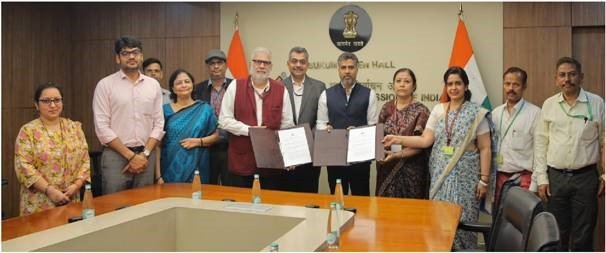Empowering Future Voters: Election Commission of India and Ministry of Education Join Hands to Introduce Electoral Literacy in Schools
This highlights the significance of the MoU and its potential to reshape the education system in India by instilling electoral literacy in young minds, encouraging active participation in the electoral process, and reinforcing the values of democracy. It calls on schools, educators, and policymakers to proactively embrace this initiative for the betterment of the nation.
In a landmark development, the Election Commission of India (ECI) and the Ministry of Education have signed a Memorandum of Understanding (MoU) aimed at revolutionizing the education system in India. The MoU outlines an ambitious plan to integrate electoral literacy and voter education into the curriculum of schools and colleges across the country, starting from classes 6 to 12. This initiative seeks to prepare the youth for their future role as responsible voters and to strengthen the foundations of democracy in India.
Key Features of the MoU:
- Curriculum Integration: The MoU systematically integrates voter education and electoral literacy into the curricular framework, ensuring that students from classes 6 to 12 in all schools receive essential knowledge about the electoral process.
- College and University Inclusion: The initiative extends to colleges and universities, tailoring content to suit different disciplines and accrediting it accordingly.
- NCERT Involvement: The National Council of Educational Research and Training (NCERT) will introduce and update textbooks to incorporate content on electoral literacy. They will also advise State Education Boards to follow suit.
- Teacher Training: The MoU emphasizes the orientation and training of teachers to effectively impart electoral literacy in classrooms.
- Electoral Literacy Clubs: It encourages State Education Departments to establish Electoral Literacy Clubs (ELCs) in schools and colleges, fostering a sense of responsibility within the education system.
- Voter Awareness Activities: Various activities will be organized to promote voter awareness among students, ensuring they are well-versed with the country’s electoral system and encouraging them to register as voters and participate ethically in every election.
- Voter ID Cards: The ECI aspires to handover the voter ID card to every student immediately after they turn 18. An institutional framework for online registration of eligible students who have reached 17+ years will be created.
- Lifelong Learning: Electoral literacy will also be included in the curriculum for adult literacy and basic education, focusing on electoral processes for lifelong learning.
- Democracy Rooms: Senior secondary schools will designate a ‘Democracy Room’ for the regular display of voter education materials and the conduct of Continuous Electoral and Democracy Education (CEDE) activities throughout the year. This room will serve as a platform for students to engage with various aspects of the democratic process.
- Leadership Skills: University students will be encouraged to develop critical thinking, communication, and leadership skills, actively participating in university-level politics, informed debates, and discussions.
- Academic Credits: A system of credits will be introduced for students participating in CEDE to pursue higher studies.
- Accessibility: The initiative will ensure the provision of standard ramps, accessible toilets, proper lighting, and electricity on a permanent basis.

A Transformational Initiative:
This initiative aims to bridge the knowledge gap among India’s youth and first-time voters. It comes at a critical time as India boasts one of the world’s youngest populations. The indifference of young people towards the electoral process could have far-reaching consequences for the country’s democratic system. In the 2019 General Election to Lok Sabha, nearly 297 million eligible voters did not cast their votes, with a voter turnout of 67.4%. The ECI has taken this as a challenge to improve electoral participation.
The MoU between the ECI and the Ministry of Education is expected to empower young people, instilling in them electoral literacy through educational institutions. It seeks to address urban and youth apathy, ultimately leading to better electoral participation in future general elections.

This collaboration between the ECI and the Ministry of Education is a significant step forward in nurturing informed, responsible, and active citizens who will play a vital role in the future of Indian democracy. It is a call to action for schools, educators, and policymakers to join hands and implement this groundbreaking initiative, ensuring that young minds are well-prepared for their role as voters and active participants in the democratic process. The ‘Democracy Room’ in schools, updated curricula, and teacher training are just a few examples of how this initiative will revolutionize education in India and set the stage for a more engaged and enlightened electorate.
The ECI and the Ministry of Education’s vision of electoral literacy in schools is a transformative endeavour, ensuring that every student not only learns about democracy but also actively participates in it, thereby strengthening the democratic values and ethos of the nation.
Credits: Press Information Bureau, Delhi